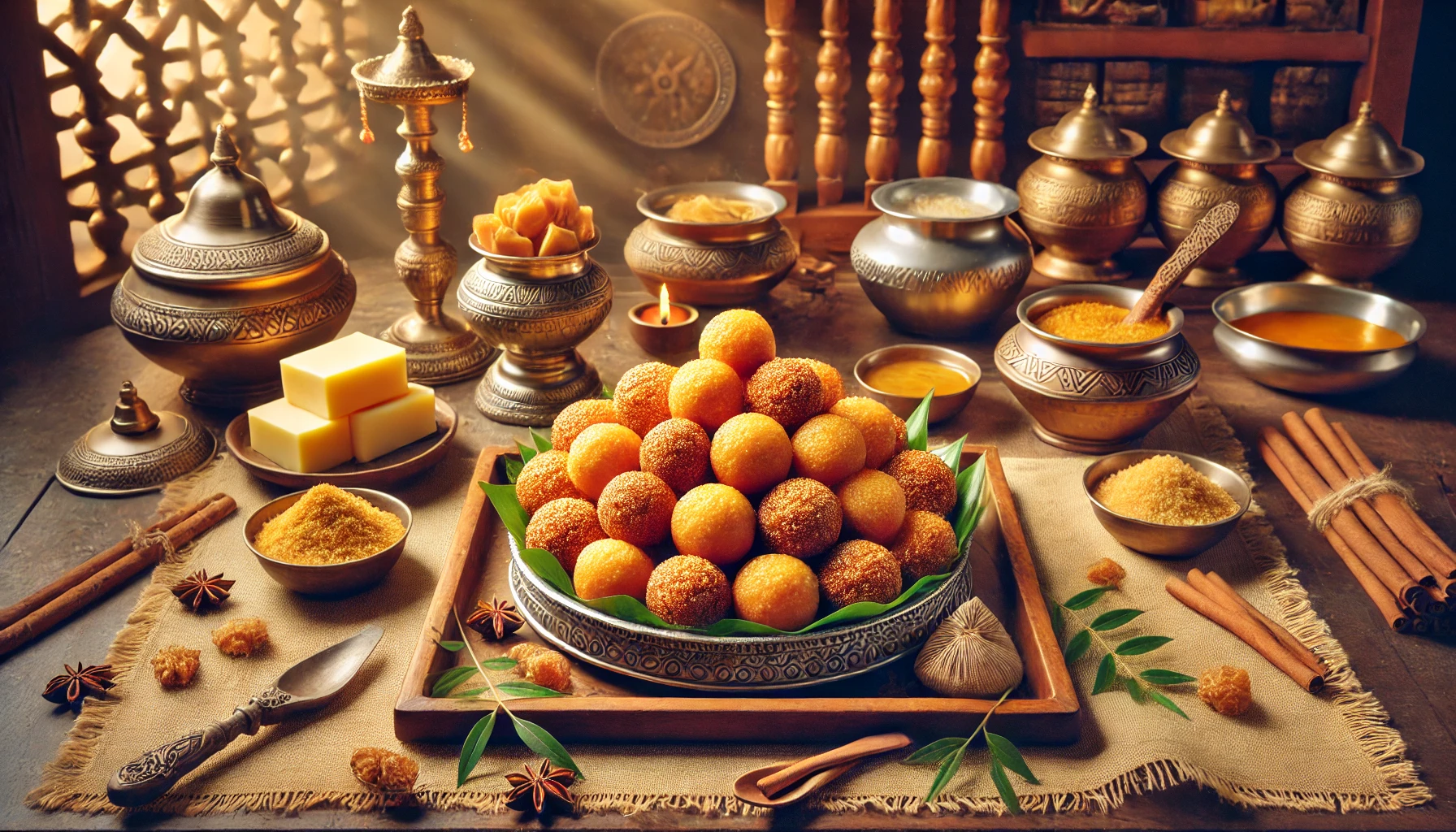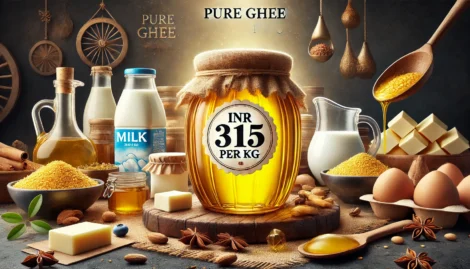- You have no items in your shopping cart
- Subtotal: ₹0.00

Delicious Tirupati Laddu Controversy: Sensational Issue of Animal Fats Explained
Introduction: Tirupati Laddu – A Sacred Tradition Under Threat
The Tirupati laddu, a prasadam (sacred offering) of the Sri Venkateswara Temple at Tirumala, Andhra Pradesh, is revered not just as a food item but as a symbol of divine blessings. With a history that stretches back over centuries, the laddu is cherished by millions of devotees who visit the Tirumala hills each year. The combination of rich ghee, sugar, flour, and nuts creates a sweet that is believed to carry the blessings of Lord Venkateswara, making it an integral part of religious rituals and pilgrimages.
However, in 2024, the sacred Tirupati laddu found itself at the center of a massive controversy. Allegations emerged accusing the Tirumala Tirupati Devasthanams (TTD), which oversees the temple, of using adulterated ingredients, including animal fats like beef tallow and lard, in the preparation of this holy offering. This has not only raised concerns about the quality and purity of the laddu but also deeply hurt the religious sentiments of millions of Hindus across the globe.
In this blog post, we will explore:
- The rich history and origin of the Tirupati laddu.
- The details of the controversy and the lab report findings.
- The potential dangers of using adulterated ghee.
- Why GheeStore stands as a trusted supplier of pure and unadulterated ghee.
The History and Origin of Tirupati Laddu
A Tradition Steeped in Devotion
The origins of the Tirupati laddu can be traced back to the year 1715 when the Tirumala Venkateswara Temple decided to start distributing the laddu as a prasadam. The laddus were originally created by the temple priests following a strict recipe, which included using only the purest ingredients, such as desi ghee, wheat flour, and sugar. The laddus were offered to Lord Venkateswara as part of the daily rituals and distributed among devotees as sacred food.
The sacred significance of the laddu lies not just in its ingredients but in the divine grace that devotees believe it carries. It is said that consuming the Tirupati laddu can bring health, happiness, and prosperity. Over time, this simple prasadam has come to symbolize the blessings of the deity and an important part of the temple’s spiritual culture.
Protected by a Geographical Indication (GI) Tag
To protect the legacy and authenticity of the Tirupati laddu, the Geographical Indication (GI) status was awarded to it in 2009. This legal protection means that only the Tirumala Tirupati Devasthanams (TTD) can produce and distribute the authentic Tirupati laddu. No other entity can manufacture or market laddus under the Tirupati name, further cementing its status as a unique and sacred offering.
The GI tag also ensured that the TTD follows strict quality control measures when preparing the laddus. This includes the procurement of raw materials, such as flour, ghee, and sugar, ensuring they are of the highest quality, and strict oversight of the production process.
The Tirupati Laddu Controversy: Animal Fats in Sacred Prasadam?
In 2024, a shocking controversy emerged when allegations surfaced that the ghee used in the preparation of the Tirupati laddu was adulterated with animal fats, including beef tallow and lard. These claims not only outraged the Hindu community but also questioned the integrity of the temple’s offerings.
Allegations of Adulteration
The controversy began when the Telugu Desam Party (TDP) raised concerns over the quality of the ghee used in the laddus. According to TDP spokesperson Anam Venkata Ramana Reddy, lab reports from NDDB CALF Ltd, a reputed lab based in Gujarat, confirmed that the ghee samples collected from the temple contained foreign fats, including animal-derived products such as beef tallow and lard. The lab results showed significant deviations from the accepted standards of pure cow ghee, sparking a public outcry.
The allegations were particularly sensitive because the use of beef or pork in any form is considered highly offensive to Hindus, especially when used in religious contexts. The lab report outlined the presence of several adulterants, leading to the following conclusions:
Key Findings from the Lab Report
- Out-of-range S-values: The lab tested five equations to measure the purity of the ghee. All five equations showed S-values that fell outside the prescribed limits, indicating the presence of foreign fats. For example:
- Equation 1 had an S-value of 86.62, whereas the standard range is between 98.05 and 101.95.
- Equation 2 had an S-value of 106.89, which was significantly higher than the acceptable limit.
- Presence of Animal Fats: The lab confirmed the presence of:
- Beef tallow (derived from cow fat).
- Lard (derived from pig fat).
- Fish oil.
- Palm oil and other vegetable oils like soybean, sunflower, and rapeseed oils.
This finding sparked outrage, with many religious groups demanding stricter quality control measures and investigations into the suppliers of the ghee used by TTD【7†source】【8†source】.
Political and Religious Reactions
The revelations caused a political stir, with opposition parties and religious groups condemning the alleged adulteration. The Vishva Hindu Parishad (VHP) and Bharatiya Janata Party (BJP) called for legal action against those responsible for compromising the quality of such a sacred offering. TDP leaders, including Nara Lokesh, son of Andhra Pradesh Chief Minister N. Chandrababu Naidu, accused the previous government led by YSR Congress Party (YSRCP) of failing to maintain the temple’s sanctity.
Religious leaders also expressed concern that the adulteration not only tainted the prasadam but also disrespected the religious sentiments of millions of devotees.
On the other hand, the YSRCP denied all allegations, calling the claims politically motivated and baseless. Former TTD Chairman Y.V. Subba Reddy dismissed the reports as fabrications designed to tarnish the image of the previous government. He argued that the TTD had always maintained strict control over the procurement and preparation processes, ensuring that only high-quality ingredients were used.
As the controversy unfolded, devotees and political leaders alike demanded transparency and stricter quality checks to prevent further adulteration.
Potential Dangers of Using Adulterated Ghee
The presence of foreign fats like beef tallow, lard, and palm oil in ghee raises significant health concerns. Pure cow ghee, when consumed in moderation, offers numerous health benefits, including improved digestion, heart health, and skin nourishment. However, adulterated ghee can have adverse effects on the body, leading to potential health risks.
1. Cardiovascular Issues
Adulterants such as palm oil and beef tallow are high in unhealthy saturated fats, which can increase cholesterol levels and contribute to heart diseases. Palm oil, often used as a cheap substitute for ghee, is linked to an increase in low-density lipoprotein (LDL), commonly known as “bad cholesterol.”
2. Digestive Problems
Pure ghee aids in digestion due to its rich content of butyric acid. However, adulterated ghee, especially with non-natural fats like lard or fish oil, may cause indigestion and bloating.
3. Toxin Build-Up
Adulterated ghee, particularly with chemical additives or low-quality oils, can lead to the accumulation of toxins in the body, weakening the immune system and causing long-term health issues.
4. Religious Sentiments and Emotional Stress
For Hindus, consuming animal fats like beef tallow and lard is strictly forbidden due to religious beliefs. The psychological and emotional distress caused by unknowingly consuming such products can lead to a breakdown of trust between devotees and religious institutions.
Given these risks, it’s crucial to source ghee from trusted suppliers who guarantee purity and quality.
Why GheeStore? The Assurance of Pure, Unadulterated Ghee
In the wake of the Tirupati laddu controversy, it has become more important than ever for consumers to be vigilant about the products they purchase. At GheeStore, we are committed to offering 100% pure, unadulterated ghee made using traditional methods that have been passed down through generations.
1. Traditional Bilona Method
At GheeStore, we follow the ancient bilona method, where curd made from desi cow milk is hand-churned to extract ghee. This method ensures that the ghee retains all its natural nutrients, including healthy fats and fat-soluble vitamins.
2. Strict Quality Control
Every batch of ghee undergoes rigorous testing in certified laboratories to ensure there are no foreign fats, adulterants, or chemicals. We comply with ISO standards for food safety, ensuring that our ghee is pure and safe for consumption.
3. Ethically Sourced Ingredients
We source milk only from grass-fed cows, ensuring that the milk is free from antibiotics and growth hormones. Our cows are raised ethically, and we take pride in maintaining the highest standards of animal welfare.
4. Transparency and Traceability
At GheeStore, we believe in complete transparency. Customers can continue to trace the source of their ghee from farm to table. You can rest assured that every jar of ghee you purchase from us is pure, ethical, and packed with natural goodness.
5. Guaranteed Purity
At GheeStore, we pride ourselves on offering ghee that is free from harmful additives and adulterants like palm oil, lard, and beef tallow. Our ghee is made from 100% pure cow’s milk, ensuring that you and your family enjoy all the health benefits without any of the risks associated with adulterated products.
The Health Benefits of Pure Ghee
Pure ghee has been a staple in Indian households for centuries due to its numerous health benefits. When made using traditional methods and without adulteration, ghee can offer a range of advantages for the mind and body.
1. Boosts Digestion
Ghee is rich in butyric acid, a fatty acid that supports gut health and improves digestion. Regular consumption of pure ghee can help maintain a healthy digestive system by promoting the production of digestive enzymes and supporting a healthy gut flora.
2. Rich in Healthy Fats
Unlike adulterated ghee, which contains unhealthy trans fats and saturated fats from beef tallow or lard, pure ghee is rich in medium-chain fatty acids that are easily absorbed and used by the body for energy. These healthy fats are essential for brain health, hormone production, and maintaining healthy skin and hair.
3. Supports Weight Loss
Contrary to popular belief, consuming moderate amounts of pure ghee can aid in weight loss. Ghee helps in mobilizing stubborn fat in the body and provides a source of energy that supports metabolism.
4. Promotes Heart Health
Pure cow ghee, when consumed in moderation, contains omega-3 and omega-6 fatty acids that can help reduce bad cholesterol levels and promote heart health. On the other hand, adulterated ghee, particularly with beef tallow or palm oil, can have the opposite effect, increasing the risk of cardiovascular diseases.
5. Enhances Immunity
Ghee is packed with essential vitamins, including vitamins A, D, E, and K, which are vital for maintaining a strong immune system. Pure ghee also has anti-inflammatory properties that can help reduce inflammation in the body and protect against infections.
6. Lactose-Free and Suitable for Lactose-Intolerant Individuals
Since ghee is made by removing the milk solids, it is virtually lactose-free and can be consumed by individuals who are lactose intolerant. This makes it a healthy fat option for those who cannot consume dairy products.
How to Spot Adulterated Ghee
With the recent controversy surrounding the adulteration of ghee in the Tirupati laddu, it is essential to know how to spot adulterated ghee. Here are a few tips to ensure the ghee you purchase is pure and free from harmful additives:
- Check the Label: Always read the label carefully to ensure that the product is made from pure cow’s milk and does not contain any additives, palm oil, or animal fats.
- Smell and Taste: Pure ghee has a distinct aroma and a rich, nutty flavor. If the ghee smells or tastes off, it may be adulterated.
- Texture: Pure ghee is smooth and creamy. Adulterated ghee may have a grainy or oily texture due to the presence of foreign fats.
- Melting Point: Pure ghee melts at a slightly higher temperature than adulterated ghee. If the ghee melts quickly and forms a separate layer of oil, it may contain adulterants.
- Source of Purchase: Always purchase ghee from trusted sources that provide transparency about their production process and ingredients.
Conclusion: Trust GheeStore for Pure, Unadulterated Ghee
The controversy surrounding the Tirupati laddu has shed light on the importance of ensuring the purity of ghee, especially when it comes to sacred offerings and daily consumption. At GheeStore, we are dedicated to providing you with 100% pure cow ghee, made using traditional methods and free from harmful adulterants.
Our ghee is not only rich in taste but also packed with health benefits that can improve your overall well-being. By choosing GheeStore, you are choosing quality, purity, and the assurance that you are consuming a product made with care and integrity.
Sources used in the content about the Tirupati Laddu controversy and the details of adulteration:
- Business Insider India: Information about the controversy, lab reports, and political reactions were taken from this source, providing detailed insights into the allegations about the use of animal fats in the Tirupati laddu. Link: Business Insider India
- Devdiscourse: This source offered a background on the lab results and the political dimensions of the controversy, highlighting the alleged use of beef tallow and lard in the laddu preparation. Link: Devdiscourse
Visit GheeStore today to explore our range of pure ghee products and experience the difference that authentic, unadulterated ghee can make in your life.



